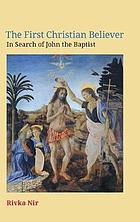 Many scholars assert that behind the obviously interpolated words about Jesus in the Antiquities of the Jews Josephus did in fact write something, either mildly positive or neutral in tone, about him. The problem with that assertion is that it is well recognized among scholars of Josephus that the Jewish historian absolutely hated everyone who, they believe, was taken to be some sort of messianic figure. Accordingly, some scholars propose that what Josephus originally wrote about Jesus was indeed a negative assessment. Hence the ongoing slide into imaginary sources so familiar to historical Jesus studies. What we read in the writings of Josephus about Jesus is beyond the scope of Rivka Nir’s exploration of John the Baptist in The First Christian Believer. But what I found interesting was that one of her reasons for questioning the authenticity of the John the Baptist passage in Antiquities falls into the same basket of reasons for questioning the authenticity of the Jesus passage.
Many scholars assert that behind the obviously interpolated words about Jesus in the Antiquities of the Jews Josephus did in fact write something, either mildly positive or neutral in tone, about him. The problem with that assertion is that it is well recognized among scholars of Josephus that the Jewish historian absolutely hated everyone who, they believe, was taken to be some sort of messianic figure. Accordingly, some scholars propose that what Josephus originally wrote about Jesus was indeed a negative assessment. Hence the ongoing slide into imaginary sources so familiar to historical Jesus studies. What we read in the writings of Josephus about Jesus is beyond the scope of Rivka Nir’s exploration of John the Baptist in The First Christian Believer. But what I found interesting was that one of her reasons for questioning the authenticity of the John the Baptist passage in Antiquities falls into the same basket of reasons for questioning the authenticity of the Jesus passage.
Palestine was riddled with prophets in the decades leading up to the War of 66-70 and John the Baptist (and Jesus, too) should be examined in this context, we so often read in the scholarly literature. The usual suspects trotted out are
- the Samaritan prophet who led crowds to Mount Gerazim in expectation of finding sacred vessels hidden by Moses
- Theudas who led a large crowd to the Jordan River in expectation of it parting just as in the days of Joshua
- the Egyptian prophet who led a crowd to the Mount Olives from where they expected to see God tear down the walls of Jerusalem
- the prophet from the wilderness who took people out into the wilderness
The attitude of Josephus to all of these prophets is well known. He branded them “false prophets, imposters, deceivers, swindlers, deluders” (Nir, 46) and he blamed them, along with “bandits and robbers” and other rebels for the destruction of the temple at the hands of Rome.
How can we reconcile?
So how can we understand writing about John the Baptist so positively? Nir writes:
His abhorrence of these prophets is consistent with his opposition to whoever sought to undermine the legitimate government and strove after any kind of change or revolution. In the passage at hand, John is described as contesting the legitimate regime and instigator of revolution: Herod feared that ‘eloquence [John’s] that had so great an effect on mankind might lead to some form of sedition [στάσις]’ and ‘decided therefore that it would be much better to strike first and be rid of him before his work led to an uprising (νεώτερος), than to wait for an upheaval, get involved in a difficult situation, and see his mistake’. The two terms (στάσις and νεώτερος) imply that John’s activity had rebellious overtones and the potential for political ferment.44
How then can we reconcile Josephus’s negative stance toward these rabble-rousers with his sympathy for John? And not only does Josephus describe him positively, he even justifies those Jews who saw the annihilation of Herod’s army as divine punishment for John’s execution: ‘But to some of the Jews the destruction of Herod’s army seemed to be divine vengeance, and certainly a just vengeance (μάλα δικαίως).
(Nir, 46f)
Nir notes that some scholars (Schürer, Meier) raise the possibility that Josephus might have made an exception for John the Baptist because of his asceticism. My response to that suspicion is to ask why Josephus did not breathe a word about John’s asceticism. The asceticism of John is an idea that comes from the gospels where it serves an evident theological function as a foil to the teaching of Jesus. If Josephus thought of John as qualitatively different from the other prophets whom he despised then surely we would expect him to make that difference explicit.
At this point Rivka Nir takes up what she considers the primary reason for doubting the authenticity of the Josephan passage: the description of John’s baptism. We’ll look at that in a later post.
Differences between John the Baptist and those other prophets
Continue reading “What Did Josephus Think of John the Baptist?”
